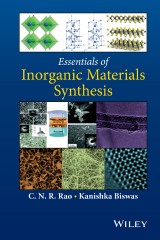Details

Essentials of Inorganic Materials Synthesis
1. Aufl.
|
88,99 € |
|
| Verlag: | Wiley |
| Format: | EPUB |
| Veröffentl.: | 20.04.2015 |
| ISBN/EAN: | 9781118892664 |
| Sprache: | englisch |
| Anzahl Seiten: | 224 |
DRM-geschütztes eBook, Sie benötigen z.B. Adobe Digital Editions und eine Adobe ID zum Lesen.
Beschreibungen
<p>This compact handbook describes all the important methods of synthesis employed today for synthesizing inorganic materials.<br /> <br /> Some features:<br /> <br /> </p> <ul> <li>Focuses on modern inorganic materials with applications in nanotechnology, energy materials, and sustainability</li> <li>Synthesis is a crucial component of materials science and technology; this book provides a simple introduction as well as an updated description of methods</li> <li>Written in a very simple style, providing references to the literature to get details of the methods of preparation when required</li> </ul>
<p>Author Biographies vii</p> <p>Preface ix</p> <p><b>1 Introduction 1</b></p> <p><b>2 Common Reactions Employed in Synthesis 7</b></p> <p>2.1 Soft-Chemistry Routes, 12</p> <p><b>3 Ceramic Methods 17</b></p> <p><b>4 Decomposition of Precursor Compounds 23</b></p> <p><b>5 Combustion Synthesis 33</b></p> <p><b>6 Arc and Skull Methods 37</b></p> <p><b>7 Reactions at High Pressures 41</b></p> <p><b>8 Mechanochemical and Sonochemical Methods 47</b></p> <p>8.1 Mechanochemistry, 47</p> <p>8.2 Sonochemistry, 50</p> <p><b>9 Use of Microwaves 53</b></p> <p><b>10 Soft Chemistry Routes 57</b></p> <p>10.1 Topochemical Reactions, 57</p> <p>10.2 Intercalation Chemistry, 64</p> <p>10.3 Ion Exchange Reactions, 73</p> <p>10.4 Use of Fluxes, 78</p> <p>10.5 Sol–Gel Synthesis, 81</p> <p>10.6 Electrochemical Methods, 86</p> <p>10.7 Hydrothermal, Solvothermal and Ionothermal Synthesis, 90</p> <p><b>11 Nebulized Spray Pyrolysis 97</b></p> <p><b>12 Chemical Vapour Deposition and Atomic Layer Deposition 103</b></p> <p><b>13 Nanomaterials 107</b></p> <p>13.1 Nanoparticles, 107</p> <p>13.2 Core–Shell Nanocrystals, 116</p> <p>13.3 Nanowires, 119</p> <p>13.4 Inorganic Nanotubes, 133</p> <p>13.5 Graphene-like Structures of Layered Inorganic Materials, 137</p> <p><b>14 Materials 151</b></p> <p>14.1 Metal Borides, Carbides and Nitrides, 151</p> <p>14.2 Metal Chalcogenides, 157</p> <p>14.3 Metal Halides, 162</p> <p>14.4 Metal Silicides and Phosphides, 167</p> <p>14.5 Intergrowth Structures and Misfit Compounds, 171</p> <p>14.5.1 Intergrowth structures, 171</p> <p>14.5.2 Misfit Compounds, 177</p> <p>14.6 Intermetallic Compounds, 178</p> <p>14.7 Superconducting Compounds, 182</p> <p>14.8 Porous Materials, 191</p> <p>14.8.1 Mesoporous Silica Materials, 191</p> <p>14.8.2 Aluminophosphates, 194</p> <p>14.8.3 Metal Organic Frameworks (MOFs), 196</p> <p>Index 201</p>
<b>C.N.R. Rao</b>, D.Sc., Ph.D,is the National Research Professor and Linus Pauling Research Professor at the Jawaharlal Nehru Centre for Advanced Scientific Research and Honorary Professor at the Indian Institute of Science, at Bangalore, India. He is a fellow of the Royal Society, London, a foreign associate of the US National Academy of Sciences and a member of many other science academies. He is the recipient of the Einstein Gold Medal of UNESCO, the Hughes and Royal Medals of the Royal Society, the August Wilhelm von Hofmann medal of the German Chemical Society, the Dan David Prize and the Illy Trieste Science prize for materials research and the first India Science Prize.<br /><br /><b>Kanishka Biswas</b>, Ph.D, is Ramanujan Fellow in the New Chemistry Unit of Jawaharlal Nehru Centre for Advanced Scientific Research, Bangalore, India. He is an Associate of Indian Academy of Sciences, Bangalore. He is pursuing research in solid state chemistry of metal chalcogenides and thermoelectric "waste heat to electrical energy conversion".
<p><b>Provides state-of-the-art, comprehensive approach to synthesizing solid state inorganic materials<br /><br /></b>Recent years have seen solid state inorganic chemistry emerge as a crucial element in products of commerce and continually fueled by the demands of industry. Given the diversity of solid state materials, an equally diverse array of methodsis used for their preparation. Responding to the increasing importance of materials synthesis, <b><i>Essentials of Inorganic Materials Synthesis</i> </b>provides an up-to-date account of the varied aspects of chemical synthesis of inorganic materials, especially methods employing mild reaction conditions.<b><br /><br /></b>Serving to assist students, teachers and practitioners in the broad area of chemistry of solids, <b><i>Essentials of Inorganic Materials Synthesis </i></b>covers:<br /><br /></p> <ul> <li>Common reactions employed in synthesis, combustion synthesis, arc and skull methods, reactions at high pressures, use of microwaves and soft chemistry routes</li> <li>Comprehensive treatment of synthesis and discussions of the techniques</li> <li>Modern inorganic materials with applications in nanotechnology and energy materials</li> <li>Key references to obtain greater details of preparative procedures and related aspects</li> </ul> <br />In contributing to mainstream chemistry and modern materials science, this book is not intended as a laboratory guide but rather to provide a well-rounded presentation of synthetic methods for inorganic materials. Written with coherence and cogency, this compact handbook should be useful to advanced engineering and materials science undergraduates and graduates, as well as materials scientists, inorganic and solid-state chemists and materials physicists.<b><br /><br /></b><b>C.N.R. Rao</b>, D.Sc., Ph.D,is the National Research Professor and Linus Pauling Research Professor at the Jawaharlal Nehru Centre for Advanced Scientific Research and Honorary Professor at the Indian Institute of Science, at Bangalore, India. He is a fellow of the Royal Society, London, a foreign associate of the US National Academy of Sciences and a member of many other science academies. He is the recipient of the Einstein Gold Medal of UNESCO, the Hughes and Royal Medals of the Royal Society, the August Wilhelm von Hofmann medal of the German Chemical Society, the Dan David Prize and the Illy Trieste Science prize for materials research and the first India Science Prize.<br /><br /><b>Kanishka Biswas</b>, Ph.D, is Ramanujan Fellow in the New Chemistry Unit of Jawaharlal Nehru Centre for Advanced Scientific Research, Bangalore, India. He is an Associate of Indian Academy of Sciences, Bangalore. He is pursuing research in solid state chemistry of metal chalcogenides and thermoelectric "waste heat to electrical energy conversion".


















